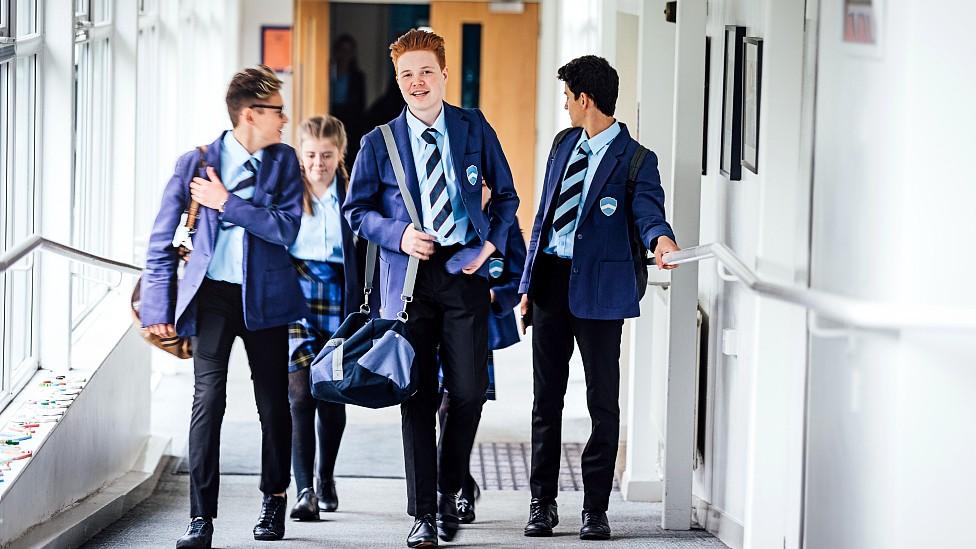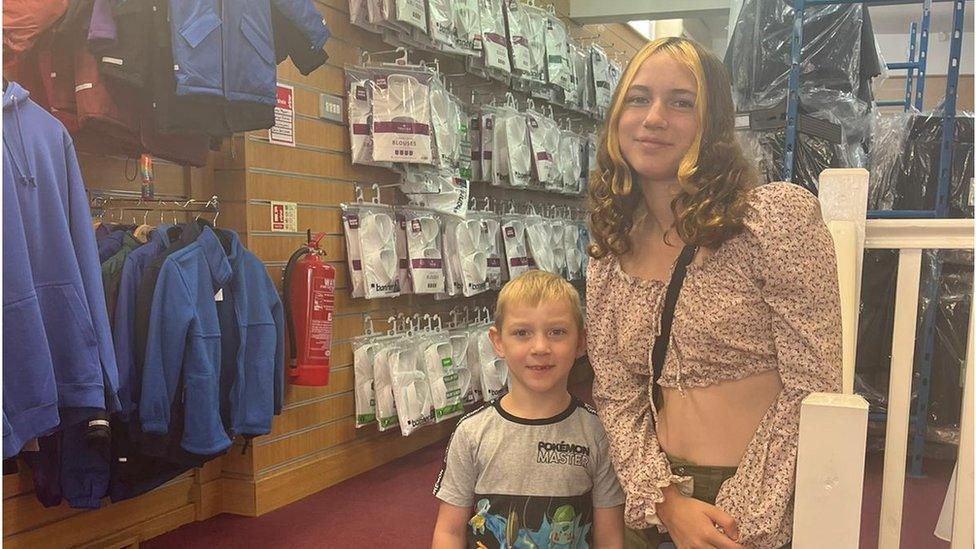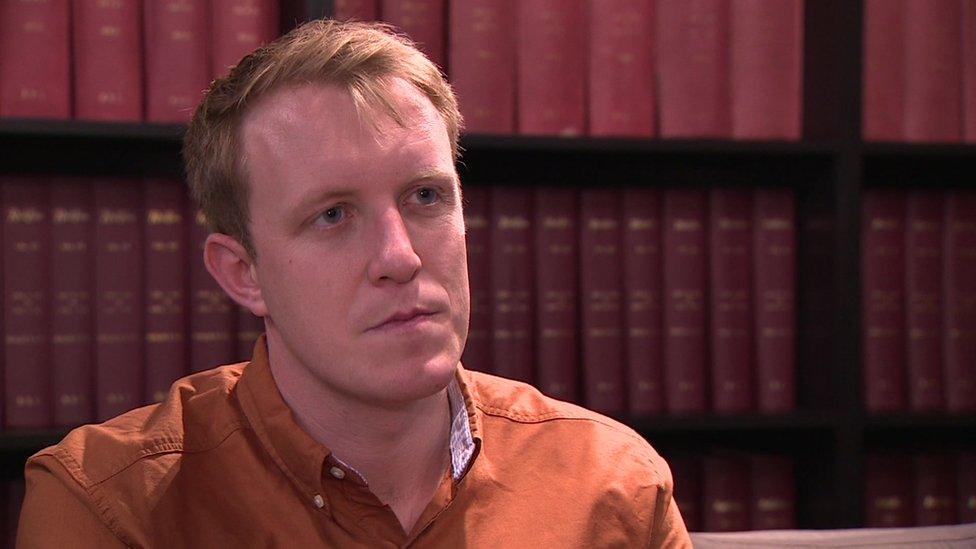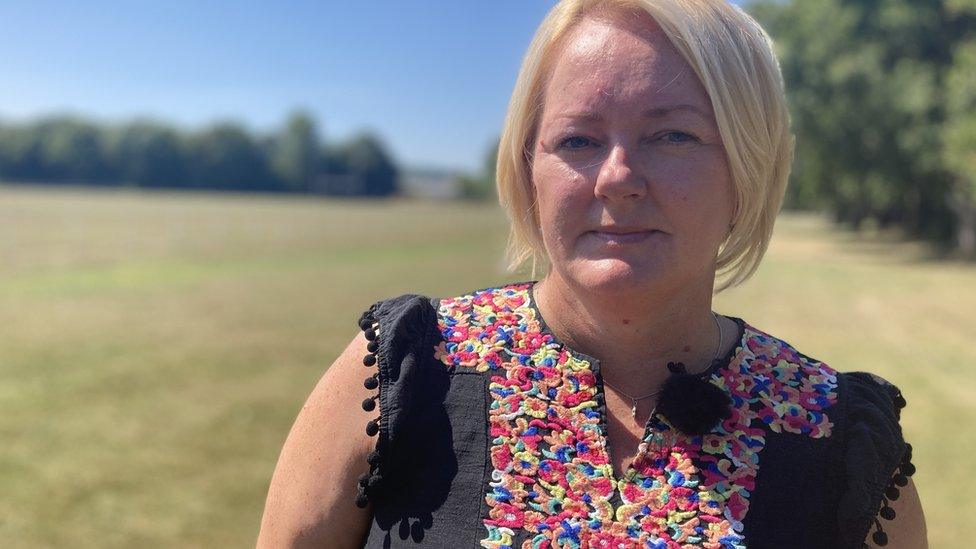Cost of living: Parents face 'fight' for school uniform cost help
- Published

Steffan Evans from the Bevan Foundation said keeping uniforms clean was another factor amid the cost-of-living crisis
More support is needed for families to be able to afford school uniforms amid the cost-of-living crisis, a charity has said.
The Bevan Foundation said the eligibility criteria for school uniform was too narrow and said more parents would need help.
One parent said she "had to fight" for a grant and was angry some families may be falling through the cracks.
The Welsh government said it was doing everything it could to help.
At Ysgol Heol Y Celyn Primary, Pontypridd, Rhondda Cynon Taf, deputy headmaster Dave Roberts said: "The safety and warmth of our children will be a priority."
However, with potentially thousands of pounds more coming out of budgets for heating and lighting through energy bills, he added: "We don't really want to be making those choices of turning the heating off at 11:00 instead of 13:00.
"You know we don't really want to be doing that. But it could come down to it. We either do that or we lose a member of staff."
On BBC Radio Wales Breakfast, he called for more parents to have access to grants for school uniforms as everyone struggles with the cost-of-living crisis.
In Wales, families are eligible for grants, external if they fall into a specific criteria which is linked to existing eligibility for free school meals.
For this year only, the Welsh government has increased the grants by £100 to help with the rising cost of living.
However, head of policy at Merthyr Tydfil-based the Bevan Foundation, Dr Steffan Evans, said more needed to be done, including relaxing uniform policies and increasing the threshold as more people feel the pinch.
'I had to fight for support'

Diza Board said she had to battle to get a uniform grant as she lives in Wales but her children go to school in England
'Money is tight'
Diza, from Saltney, Flintshire has two children aged seven and 13, who go to school just over the border in Chester.
She said she had to fight for the uniform grant, despite the school falling in the catchment area, and said she would have missed out on £500 in support had she not appealed to the Welsh government following a series of rejections.
Flintshire County Council said it paid the grant in this instance as soon as it was informed by the Welsh government that Welsh local authorities on the border were able to award the grant to children attending school in England.
Although glad of the money, she said she was angry some families may keep falling through the cracks and end up struggling.
"Money is tight and I am quite concerned about energy bills," she said.
"I am not as worried about myself as I am quite good at money management but I have friends and family who are struggling massively and I do wonder if that is going to get harder."
She said uniform should either be provided by schools instead of grants or policies should be relaxed to avoid a "uniform deficit".

Diza says she had to put up £400 before the grant came in which would have otherwise been spent on activities with her children
She said her daughter's high school required a £45 blazer and allowed one brand of trainers which "sets a standard not a lot of families can meet".
Her son - who has additional needs - needs to have catered uniform due to sensory issues and she said he grows so quickly it is not just a one-off purchase.
"I don't want my kids to have to worry about scuffing their knees or playing in puddles," she said.
"School uniform is an essential regardless of your income - everyone child has to wear one.
"So why people are expected to go out and buy such varied options. It doesn't seem to be the fairest ground to start with."
A spokesperson for Flintshire council confirmed the resident had now received payment for the school uniform grant.
"We would encourage any other parents who believe they may now be eligible to apply, external," they said.
'Help ease the burden'

Steffan Evans from The Bevan Foundation says edibility for grants needs to be widened and schools need to relax strict branding requirements on uniform
Dr Evans said the Bevan Foundation has found "a lot of families are finding life very difficult" and given the expected rise in energy costs, it is only going to become more of a challenge.
"Increasing the provision of support and taking action to reduce the cost of uniform are both steps that will make a real difference across Wales," he said.
He said the charity welcomed Welsh government action of higher grants for all age groups but with a requirement to be earning less than £7,400 a year if they receive universal credit, it was "really is quite a low bar".
"In the current context where we know that in a lot of families even if both parents are working but finding life difficult and they're going to miss out on that support which could make a difference."
Dr Evans said the charity wanted the eligibility criteria set at the same level as universal credit to make them "more accessible to people".
He added reducing some of the standards around uniforms at school level could "allow those who receive support to go even further and for those who miss out it eases some of the pressure that they may be facing".
He said this was not just in the cost of the uniform but the cost of washing them and taking into account growing children.
"Thinking about the context we are going to be facing this winter where people are going to really difficult to pay for electricity and gas, they are going to need multiple items as they can't afford to run a wash that isn't full," he said.
"We need that flexibility so it allows people to buy from supermarkets etc and allow that money to go a little bit further."
Average annual cost in UK
£337per year for a secondary school pupil
£315 per year for a primary school pupil
£105what parents think is a reasonable cost for secondary school uniform
£85what parents think is a reasonable cost for primary school uniform
A Welsh government spokeswoman said many families were struggling with the cost of living crisis, and it encouraged all schools to ensure policies were "inclusive for all", with guidance due to be updated shortly.
"Our school uniform guidance means schools must keep the cost uniforms to a minimum and many families on lower incomes are eligible for PDG Access to help with the cost of school uniforms and other school items," she said.
"This is the most generous scheme in the UK, and parents and guardians should contact their local authority to check their eligibility and apply."
'It's an ecological issue too'

Former teacher Helen O'Sullivan said uniforms swaps could help solve the economical and ecological issues
One former teacher and sustainability campaigner has called for a national uniform swap shop to be set within all schools so parents can exchange clothes.
"With the cost of living crisis, there isn't really going to be much of an alternative for some families unfortunately," said Helen O'Sullivan, founder of Sustainable Fashion Wales.
"So it is essential that we have these swap shops in schools for those families. The scope of people struggling financially is widening so much, people outside of free school meal entitlement are going to need help."
Ms O'Sullivan was a textiles teacher at Penyrheol Comprehensive School in Swansea until this summer and said all schools would benefit, not just those in poorer areas.
She added "it not just a economical issue but an ecological one," as many items are made from synthetic fibres that come from fossil fuels and are only worn for a few months.
"As the costs mount up and with a choice of heating or eating, school uniforms are going to be at the bottom of the pile," she said.
Ms O'Sullivan added another "big issue" was schools demanding pupils wear branded uniform purchased from specialist outfitters.
"The whole point of a uniform is that all children look the same and you can't tell who comes from a deprived background," she said.

WALES' HOME OF THE YEAR Which home will Owain, Mandy and Glen judge worthy?
IOLO: A WILD LIFE: Iolo delves into the archives from the past 25 years

- Published28 July 2022

- Published15 August 2022

- Published16 August 2022
